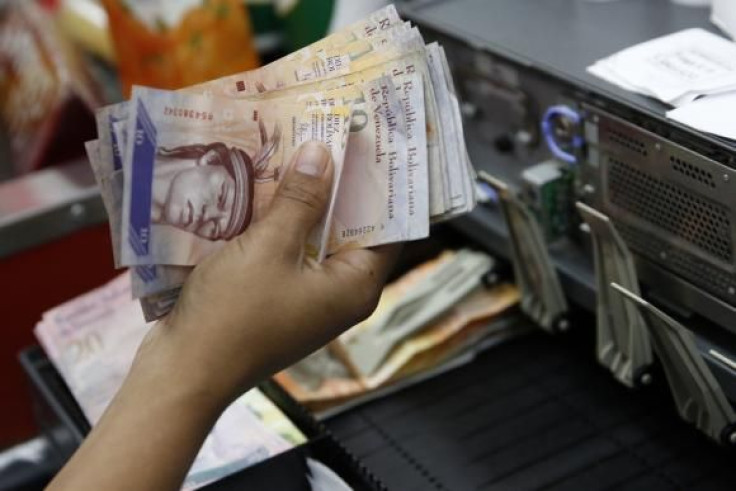Venezuela's Currency Woes An Increasing Threat To US Corporate Profits

(Reuters) - Venezuela's deepening economic troubles, and in particular the weakness of the bolivar and restrictive currency controls, have hurt U.S. corporate profits for the fourth quarter of 2014 and are set to inflict further pain this year.
In a likely sign of things to come from a number of companies this results reporting season, Ford Motor Co. on Friday said it was taking a pre-tax charge of $800 million for its Venezuela business.
It blamed Venezuelan exchange control regulations that have restricted the ability of its operations in the country to pay dividends and obligations in U.S. dollars. Ford also said that it was unable to maintain normal production in Venezuela with the availability of vehicle parts constrained.Also on Friday, diaper and tissue maker Kimberly-Clark Corp said it took a fourth-quarter charge of $462 million for its Venezuelan business.
That was after it concluded that the appropriate rate at which it should be measuring its bolivar-denominated monetary assets should be a Venezuelan government floating exchange rate - currently at around 50 bolivars to the dollar - rather than a fixed official rate of 6.3 to the dollar that it had previously been using.
Kimberly-Clark blamed increased uncertainty and lack of liquidity in Venezuela for the move.Venezuela President Nicolas Maduro said on Wednesday he was shaking up the complex currency controls in the socialist-run country, where dollars are sold on the black market for about 184 bolivars to the U.S. dollar instead of the country's three-tiered exchange rate system that has ranged from the 6.3 official rate to two other rates, currently at about 12 and the one at around 50.
Those latter two tiers of the system would be merged, he said, though it is not immediately known at what rate that would happen. Maduro also announced that another new rate would be introduced into the system to offer dollars via private brokers to vie with the black market rate.
The latest moves may catch some companies flat-footed - particularly regarding the size of the hit they may have to take to their earnings as they revalue assets at a much weaker bolivar exchange rate.
"They may be surprised by the magnitude of the move but not by the direction," said Marc Chandler, global head of market strategy at Brown Brothers Harriman & Co. "But many shied away from hedging in the past because it is very expensive.”
ISOLATING VENEZUELAN BUSINESS
Companies often need approval from Caracas to raise prices amid soaring inflation. Sometimes that approval is delayed or the price hikes don't keep pace with a 12-month inflation rate currently at nearly 64 percent, threatening losses because of a mismatch between costs and revenue.
Before the move by Maduro, some well known U.S. companies, including Procter & Gamble, General Motors, Baker Hughes Inc and Brink's had already reported financial hits related to the bolivar over the past year.“A wide swath of multinational companies with large operations in Venezuela will suffer from having to hold currency that is stuck in the country and depreciating in value," said Erik Gordon, professor of law and business at the University of Michigan.
For Ford, conditions are so tough in the South American country that it also announced on Friday that it will make an accounting change that will allow it to isolate the rest of the company from its Venezuela operations.
"In future periods, our financial results will not include the operating results of our Venezuelan operations," it said in a corporate filing.Bob Willens, a veteran accounting expert on Wall Street, said other companies might follow Ford's lead. "Who wouldn’t want to deconsolidate a Venezuelan subsidiary?” he asked.
Cleaning and household products maker Clorox last year decided to exit Venezuela altogether. CEO Don Knauss told analysts in October that Venezuela's government was slow to approve price increases and when it did they were not as high as promised.
"We saw no hope that we could create a sustaining business in that country," Knauss said during an October conference call.Overall, foreign companies have an estimated $16 billion in outstanding dividends listed on their balance sheets that they have not been able to return to headquarters, according to Caracas-based research firm Ecoanalitica.
The actual value of those assets could, though, be considerably less, depending on the exchange rates.At the end of the third quarter, for example, American Airlines Group Inc, had $721 million held in the Venezuelan currency, at a weighted average exchange rate of 6.41 bolivars to the dollar.Theoretically, if the airline tried to repatriate all of that money into dollars at the current black market rate of 184 bolivars per U.S. dollar as quoted by the website dolartoday.com, it would only receive about $25 million.
"For a business like American Airlines, they have a bank account full of worthless monopoly money, and the only way it is worth something is if they can get an exchange," said Russ Dallen, head of Caracas Capital Markets in Miami. "But the government doesn’t have any dollars to exchange, in size. They can’t pull out because not only will they not get the dollar at the original rate promised but the Venezuelan government said they would take the travel routes and never let them back into the country if they did.”
American Airlines did not return messages seeking comment.
(Writing by Tim McLaughlin; Additional reporting by Svea Herbst, Daniel Bases, Bernie Woodall, Brian Ellsworth and Gertrude Chavez-Dreyfuss; Editing by Martin Howell)
© Copyright Thomson Reuters 2024. All rights reserved.











